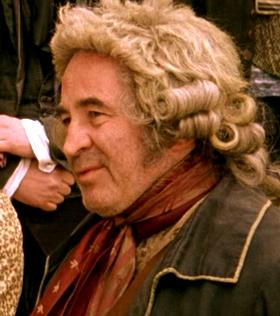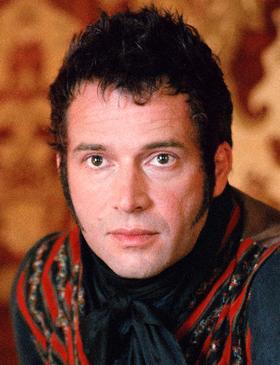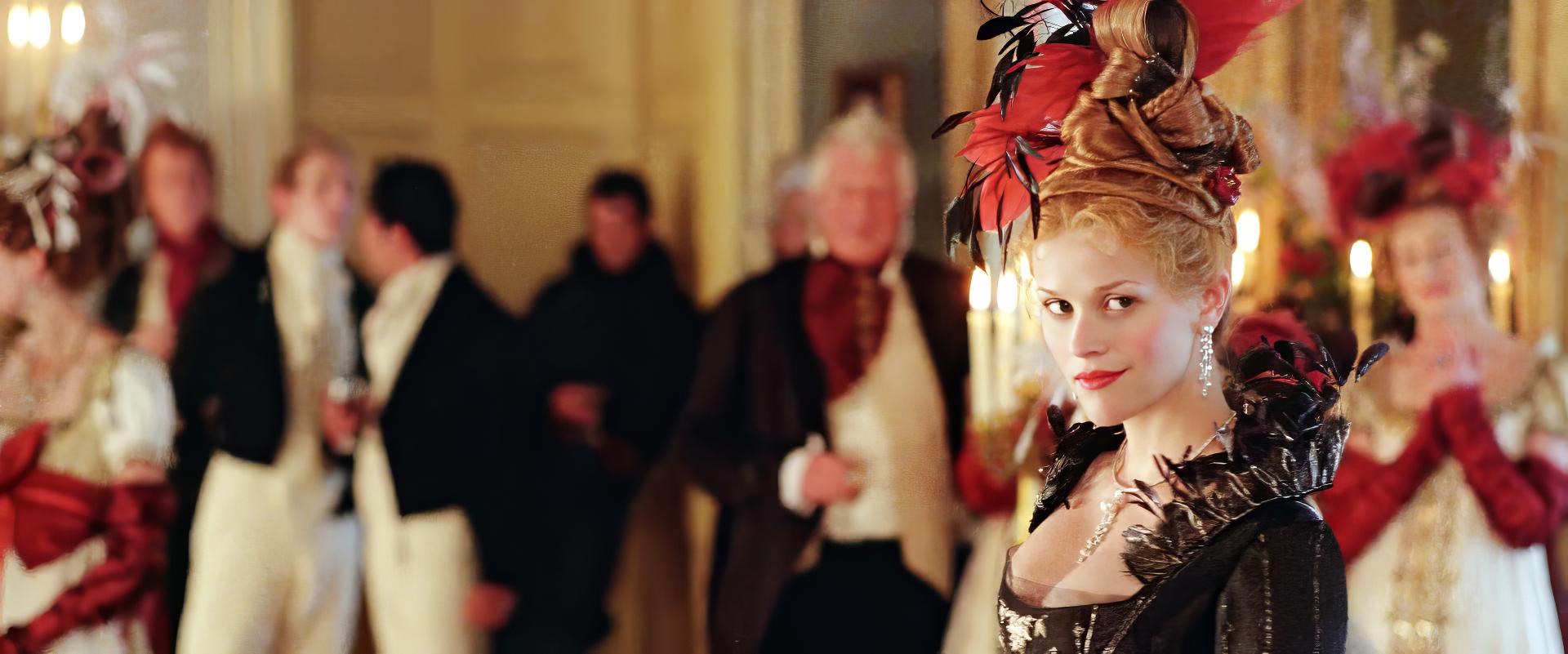Vanity Fair
 for some sensuality/partial nudity and a brief violent image.
for some sensuality/partial nudity and a brief violent image.
Reviewed by: Sheri McMurray
CONTRIBUTOR
| Moral Rating: | Offensive |
| Moviemaking Quality: |
|
| Primary Audience: | Adults |
| Genre: | Romance Comedy Drama |
| Length: | 2 hr. 17 min. |
| Year of Release: | 2004 |
| USA Release: |
September 1, 2004 |






What does the Bible say about pride and humility?
What is true love and how do you know when you have found it?
For a follower of Christ, what is love—a feeling, an emotion, or an action?
What is sexual immorality?
Sexual lust outside of marriage—Why does God strongly warn us about it?
Purity—Should I save sex for marriage?
Temptations—How can I deal with them?
Consequences—What are the consequences of sexual immorality?
 Learn how to make your love the best it can be. Answers to questions about sex, marriage, sexual addictions, and more.
Learn how to make your love the best it can be. Answers to questions about sex, marriage, sexual addictions, and more.
What is the Biblical perspective on war?
War in the Bible

Hearts void of God… and the destructive effects on those around us
Betrayal
Social climbing
Decadence
Upper classes living in sumptuous excess
Selfishness
Greed
About money in the Bible
What is sin and wickedness? Is it just “bad people” that are sinners, or are YOU a sinner? Answer
| Featuring |
Reese Witherspoon … Becky Sharp Kate Fleetwood … Miss Pinkerton’s Crone Rhys Ifans … William Dobbin Gabriel Byrne … The Marquess of Steyne Jonathan Rhys Meyers … George Osborne Jim Broadbent … Mr. Osborne James Purefoy … Rawdon Crawley Bob Hoskins … Sir Pitt Crawley Eileen Atkins … Miss Matilda Crawley Tom Sturridge … Young Georgy Geraldine McEwan … Lady Southdown Barbara Leigh-Hunt … Lady Bareacres See all » |
| Director |
Mira Nair |
| Producer |
Janette Day Lydia Dean Pilcher See all » |
| Distributor |
“All’s fair in love and war”
Here’s what the distributor says about their film: “Despite her poverty-stricken background, Becky Sharp (Reese Witherspoon) ascends London’s social ladder. Based on the classic novel by William Makepeace Thackeray.”
The costumes were stunning. I felt as though I were in the world of the early 19th century. The “parlez” was impeccable; spoken with the flair of the English upper crust with snooty “classe.” La notion was to be all that “Vanity Fair” should be as told by William Makepeace Thackeray, but alas the spirit of schemer and social climber Becky Sharp was “tres ordinaire!”
Thackeray himself stated of his novel that he “(wanted) to leave everybody dissatisfied and unhappy at the end of the story,” but we are treated to director Mira Nair’s formula happy ending. I would have preferred the pathos of the original novel. In this version I couldn’t make out if I was watching a drama or a comedy. The audience was shuffled from near tears to comedic narrative jumps. This film had all the ingredients for an epic costume drama akin to Gone With The Wind, but just never got going. Never the less, I enjoyed myself and Reese Witherspoon has shown she is capable of a more meaty part, although she hasn’t quite found her nitch yet.
Rebecca Sharp (a too good hearted Reese Witherspoon) has been orphaned and sent to a girl’s boarding school/orphanage where she secures a strong friendship with sweet Amelia (a tragic Romola Garai) who invites Becky to a visit in her home before she goes off to her new job of governess to a family of slovenly aristocrats. While in Amelia’s circle of family and well-to-do friends Becky spies her way to the top by setting her sights on Amelia’s world traveling brother Jos (a clueless Tony Maudsley) and almost nabs him but for the strict objections of Amelia’s elite family.
Miss Sharp is shipped off to the seedy digs of Sir Pitt Crawley (a perfectly nasty Bob Hoskins) as Governess to his children and wins the day by pulling his home together to impress his wealthy spinster Aunt Matilda (the best performance in this movie by Eileen Atkins). Becky impresses Aunt Matilda more than her own family and Matilda decides to take Becky under her wing. They travel to London where Becky learns just what she needs to know about high society and how to get her way in it.
When Becky marries Matilda’s dashing soldier/gambler nephew Rawdon Crawley (James Purefoy) and has his child, he is written out of Aunt Matilda’s will. We just couldn’t have the lower class mingling with the pure of blood, even if Aunt Matilda originally liked Becky to begin with. There is a limit to her kindness and shows how conceit and intolerance destroys all those in their path.
Meanwhile, Amelia weds the flirtatious George Osborne (a shallow character done well by Jonathan Rhys-Meyers) and in turn George is banished from his father’s fortune because of this unapproved marriage. Monsieur Osborne is adamant that his son marry into wealth at any cost and shows that his vain and shallow goals lead to heartbreak when his son is killed in the Battle of Waterloo without ever knowing his father’s love for him.
With the disinheritance and poverty biting at their heels, Becky sees no other way to prosperity but to seek out the dangerous and powerful Marquess of Steyne (an eerie and ruthless Gabriel Byrne) for assistance. He is more than happy to pay off her debts and set her up in high society, but at a price. Hoping to alleviate all their woes Becky only creates a void between herself and Rawdon who in the end leaves her going back to soldiering and eventually dying of fever in a far away land never knowing how much Becky has given up to rescue their material worth.
Although done well with a beautiful emphasis on period costume and design, “Vanity Fair” left me wishing it had a richness to the fabric of it’s characters as well. Even though it was meant to be poignant it didn’t bring the viewer into the character’s lives as deeply as needed to truly sympathize with their plights. Instead of “delicieux” it was “c’est damage.”
Although sex was alluded to, no love scenes were objectionable because they were few, didn’t show much “skin” and were consistent with the story.
There were no swear words in this film. The PG-13 rating was bestowed because of these points, but parents should be cautioned to discuss what betrayal and lust for material excess means. Especially in our world today kids are learning that self-worth is only achieved by education and possessions without giving a thought to God’s direction or unconditional, self-sacrificing love.
Knowing God loves us and will provide all our needs would have been a blessing to Becky. By His provision we need not take matters into our own hands and believe we must do wrong to make things right. As Becky found out, selfish notions and thinking there is some mystic power in sexuality to get what we want or need only leads to heartache. The characters in the world of “Vanity Fair” are confused and full of fear without the Holy Spirit, The Comforter. First John 4:4 declares “Greater is He that is in you, than he that is in the world.”
Teach your little ones to go to God with all their worries, problems and human needs through prayer.
If Becky Sharp knew Him, perhaps her life would not have been in a grand castle or high society, but I know her life would have been full and her love complete.
Through this film we wallow in exoticism, love, war, betrayal, decadence and battles with pride and of course “vanity” which is not at all “fair.” The spoiled upper classes living in sumptuous excess is richly captured at best and a touch of soap opera at worst, “Vanity Fair” depicts for us the nature of greed and sin—how the hopes of material wealth, selfishness, vanity and a heart void of God can separate us from and even destroy those we should love, honor and cherish.
In real life, many people run after things believing they will fill them up and make them whole—only to find these pursuits are empty and unfulfilling. Only Jesus can fill the void in our lives and bring true happiness and fulfillment!
Although this novel and film are fictional, they ring true with the sorrows of all people obsessed with getting everything at any cost—“…and then I’ll be happy.” I pray that viewers will understand that this film personifies that empty quest. Psalm 19:7-11 says it best.
The law of the Lord is perfect, converting the soul;
The testimony of the Lord is sure, making wise the simple;
The statutes of the Lord are right, rejoicing the heart;
The commandment of the Lord is pure, enlightening the eyes;
The fear of the Lord is clean, enduring forever;
The judgments of the Lord are true and righteous altogether.
More to be desired are they than gold,
Yea, than much fine gold;
Sweeter also than honey and the honeycomb.
Moreover by them Your servant is warned,
And in keeping them there is great reward. —Psalm 19:7-11 NKJV
Violence: Mild / Profanity: None / Sex/Nudity: Moderate


However, the story leaves a lot to be desired. Without giving away too much, the story hinges on the ambitions of a Rebecca Sharp (Reese Witherspoon), the daughter of an impoverished artist, to make it in early 19th century British society. While she does not do this so ruthlessly as to warrant the phrase “by any means,” her actions are definitely less than moral. Various people in her environment suffer from her bad choices and priorities, including her husband, son and best friend. Vanity and greed blind her seriously. When she finally comes to her senses and gives up her ambitions in return for the affections of a perfectly sweet and honest man, she has caused a lot of mayhem. In the end, the message of the movie is disapproving of immoral behavior which, combined with the relative cleanness of the movie regarding, sex, violence and language, make it one of the safer movies for adults. The adult situations and plot principles make it less suitable for under-sixteens, though.
But on an artistic level one has to complain. It is decidedly a second-rate movie. It is only by the breadth of a hair that the audience can hang on to the plot developments. The characters are so underdeveloped and some plot twists are so minimally motivated that it leaves one wondering about the reason or meaning behind some of the characters’ actions. Reese Witherspoon is not the most fortuitous choice because not always convincing Becky Sharp. There are delightful moments with some of the inevitable stock types, such as Bob Hoskins who plays a marvelous Baronet Crawley. But the movies tastes, at every turn and plot twist, like a cliché, canned costume drama: bland and not at all satisfying. This is, at best, a “B-” if that.
[Better than Average/3]
My greatest complaint with Vanity Fair is its lack of explanations. One moment Becky is indifferent to Rawdon, the next she’s telling his aunt that they’ve been married in secret. George burns Amelia’s letters to him in disgust before the eyes of an astonished friend, but refuses his father’s orders to marry well, instead choosing to keep his promise to Amelia. Why? Was it because of sheer rebellion toward his father, or was there a smidgeon of responsibility in his breast after all? Minor characters also drive us to distraction. I wanted to slap Amelia for being such a silly twit when it came to the man who truly loved her. Fortunately all of this is rectified in the end.
These flaws aside, the production is lavish and the acting exquisite. If you’re a fan of these films in general, you’ll enjoy the glimpse into the Napoleonic period and find Reese’s performance worthy of an Oscar nomination. For the most part it’s decent but the reviewer neglected to mention a scene of brief backside nudity. The ending, while ambiguous, gives audiences the chance for interpretation: is Becky just an adventurer, or are her ambitions higher after all? Altogether it’s slightly flawed in terms of writing, but beautiful nevertheless.
[Better than Average/5]
I don’t want to say this was a waste of time; I don’t regret seeing it. It’s a marginally positive rating I’d give this one; it’s definitely not for everyone, though. I am a bit confused as to why this was given an “offensive” rating by the main reviewer on the site. I was expecting much worse and found it to be a rather mild PG-13.
[Average/4]
[Average/5]
I found it so fascinating that Amelia believes that her husband George deeply loves her, when truly he regrets their marriage and is a complete rat; and Becky is blessed with a husband who does honestly love her, but she can’t see how dear it is. It was good to see Becky set Amelia straight about Dobbins!
There is sensually suggestive language from beginning to end. The dresses are usually quite low. The Indian dance sequence was no worse than what you see in The Ten Commandments and Ben Hur.
My biggest complaint is that some scenes jump right into the next without any breathing space. There are some things you wish you could have seen instead of hearing through dialog, in particular Becky and Rawdon’s wedding. Where did that come from?
The two lines that I appreciated the most and the ones that I will remember are: when Becky tells Rawdon that “only two men will ever enter my bedroom, my husband and the doctor.” and before leaving for battle, Rawdon tells Becky to “remember that you were the most loved woman.”
I’d recomend this film to mature mothers and daughters to watch together and then discuss it. It definitely caused my group to talk, and then I went home and cried.
[Very Offensive/4]
Certainly we all know that the skimpy, cleavage baring costumes are designed to attract attention to the body. And let’s be honest: there’s a lot more breast showing than simply “cleavage.” In fact, cleavage can’t exist without two breasts to form it. Are we ever going to draw a line of demarcation that says any inappropriate showing of bodies will determine that I will not see a particular movie? Why do we allow ourselves to view almost entire breasts, nude fannies, and nearly nude entire bodies? It seems the line is drawn at nipples and vaginas. The Christian culture shamelessly watches almost anything in the name of entertainment. Entertainment takes precedence over choosing to obey God’s instruction for holy living. We need to begin to study God’s Word for its definition of holiness (set apart, perhaps?)!!
[Better than Average/4½]
Quite to the contrary, I found Vanity Fair to be excellent for several reasons. First, The costuming and art direction were breathtaking. Second, I found that the theme or “point” of the movie made it one of the best I have seen this year. Many movies have tried to explore and show that beauty and material goods are essentially worthless and that greed destroys, but none have brought this point across as well as Vanity Fair. This is partially due to the fact that the Reese Witherspoon’s Becky Sharp reaches out and charms the viewer so that, when Becky’s greed devastates her life and the lives of those close to her, the viewer is able to feel the devastation and get a deep understanding of just how worthless worldly goods are in the long run.
To be quite honest, when my friend and I came out of the theater, she looked at me and said something to the effect of “I sort of hope that I don’t end up really rich, and that I don’t end up with a lot of money, because money can rarely buy happiness, it usually just destroys it.” This was exactly what I had been thinking, and it was then that I fully realized that this movie was quite a masterpiece to be able to portray this fact in such a crystal clear way.
Third, the acting was fabulous. I felt that each actor/actress did a good job with their characters, and brought humanness to each character. Reese Witherspoon portrays a Becky Sharp with wit. The movie is certainly not without its faults. The dresses are often dangerously low-cut, and I was very tired of seeing ladies stuffed into dresses like that by the end of the movie. There is a brief scene of nudity of an old lady getting out of a bathtub. It is comically disgusting as opposed to sensual. The “love” scenes only “imply,” they don’t “show” what happened, plus they are between a husband and wife. There is brief violence (fistfight) and at one point, the camera pans over a battlefield which is strewn with dead bodies.
I would definitely recommend this movie to the teenage/adult audience as well as to mature preteens (11-13). Due to certain thematic elements, I would encourage parents to watch “Vanity Fair,” and then decide if it is appropriate for their younger children to see.
[Average/4]




Reese Witherspoon is a mediocre actress who carried this role poorly. Unfortunately, plastering an American starlet’s bust on the movie posters was necessary in order for any measurable audiences to attend.
I’m still scratching my head over the PG-13 rating. Not sure how they achieved that. PG seems more fitting. This movie is thoroughly enjoyable. It is well-written, well-acted for the most part, and frosted with beautiful sets and costumes. If you are a fan of Jane Austen or Elizabeth Gaskell adaptations, you will enjoy this film.
Most theatre goers in our society automatically discard costumed period dramas as dry and boring. Dimensional, challenging, and intelligently humorous pictures such as this one will never again score large numbers in the box office. Nevertheless, I won’t miss a chance to view such diamonds in the rough of modern-day, gratuitous fluff.
My Ratings: [Average/4]